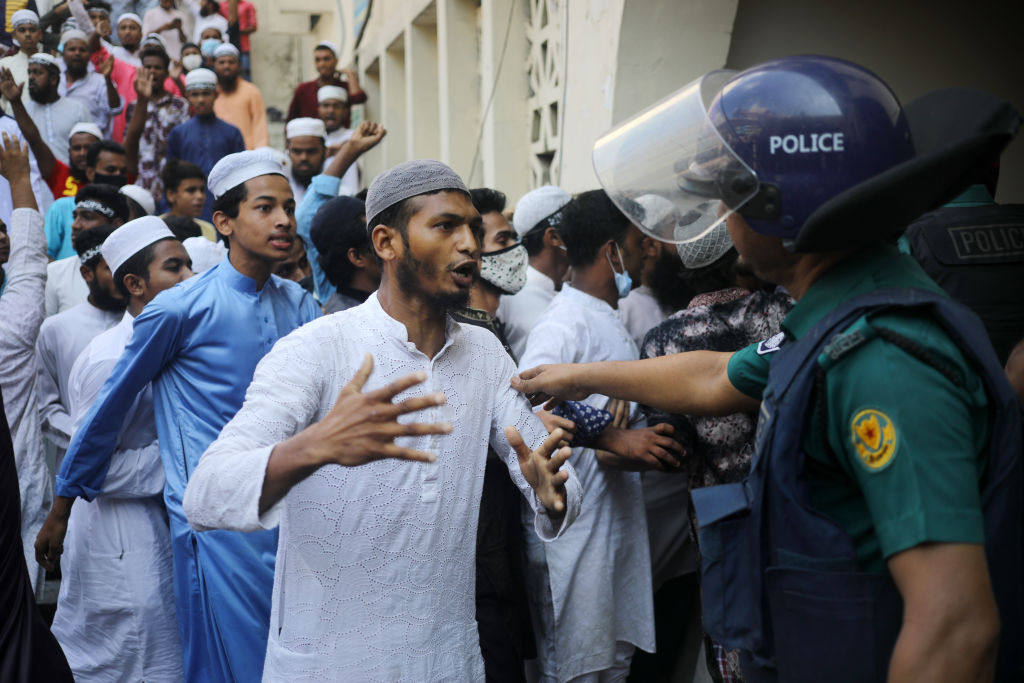MUBASHAR HASAN

Last month, a series of attacks on religious minorities in Bangladesh shook the country’s typically pluralist outlook. The violence began after a Facebook post from Comilla district in the southeast of the country alleged that the Quran, the holy book for Muslims, had been desecrated at a Hindu Durga Puja festival site. The allegation was broadcast live and rumours quickly spread.
According to a local newspaper report, more than 100 Hindu temples, festival sites, shops, and homes were attacked. Seven people were killed, and a Buddhist monastery at the country’s southwest was also set on fire. Police later arrested a man they said had confessed to having deliberately left a copy of the Quran at the Hindu festival site.
The attacks also exacerbated religious tensions in neighbouring India, making international headlines. People in favour of India’s controversial citizenship act, which has been dubbed an anti-Muslim law for offering amnesty to non-Muslim irregular immigrants from neighbouring countries, cited the attacks in Bangladesh as a justification for the law.
Realising its reputation for protecting minorities was on the line, the Bangladeshi government quickly arrested more than 400 people and filed 72 cases. The Foreign Affairs Ministry reportedly sought to reassure foreign missions that the government was committed to preventing attacks on minorities.
However, almost every year since 2012 religious minorities have been attacked somewhere in Bangladesh after online posts promulgating false allegations. The pattern runs like this: rumours begin within a local community that people from a minority background have defamed Islam, and such orchestrated “fake news” quickly spreads online to incite violence against minorities.
While Facebook remains a key platform for inciting hate and violence towards minorities in Bangladesh, three other factors are important to understand why these deadly rumours attract mobs who then attack minorities for alleged blasphemy.
Firstly, studies in recent years have identified shifting trends in Islamic majoritarianism in Bangladesh where blasphemy and atheism are deemed to have deadly implications. Atheist bloggers have been murdered by violent Islamists, for example, and several “blasphemous” writers, cartoonists, publishers and bloggers now live in permanent exile.
Many religious attacks on Bangladeshi minorities are actually done on the guise of an attempt to steal land belonging to Hindus.
The prejudice stems from a view that non-Muslim culture unsettles what is deemed to be “majority Islamic culture” in the country. For example, radical Islamists have voiced criticism about the iconic Bengali procession known as Mongol Shovajatra celebrating the Bengali new year featuring birds, owls, fish, animals, and other motifs. My research has also found that many Islamists problematically connect these replicas and idols with Hindu culture and call for a boycott.
The recent spasm of violence against minorities in response to fake blasphemy allegations must be seen as the manifestation of social trends where minorities are deemed as inferiors to many because of their faith.
Secondly, the rise of transnational Hindutva ideology in India has amplified and solidified a sense of a supranational Muslim identity, or ummah, among some in Bangladesh. Bangladeshi social media is abuzz with the alleged sufferings of Muslim minorities in India. India’s unequivocal support to the current Bangladeshi regime has furthered exacerbated anti-India feelings among critics and opponents of the government.
That sentiment has translated to anti-Hindu feelings and at times violence towards minorities, feeding a misapprehension among some in the country that Hindus are more inclined to support India than Bangladesh. Bangladesh’s Prime Minister Sheikh Hasina appeared alert to the crossover challenge following the recent violence when declaring, “We expect that nothing happens there [in India] … which could influence any situation in Bangladesh affecting our Hindu community.”
Thirdly, many religious attacks on Bangladeshi minorities are actually done on the guise of an attempt to steal land belonging to Hindus. Following the recent attacks, Rana Dasgupta, General-Secretary of the Hindu, Buddhist, and Christian Unity Council in Bangladesh, told the BBC “[t]here is an orchestrated attempt to grab Hindu houses and lands in Bangladesh, and [people] are being forced to leave the country.”
Local politics is also at play. As the ruling Awami League has consolidated power and is now effectively without a viable opposition, there are indications that rivalry over resources (including land grabs) within the ruling party is becoming entrenched. In one local district, two rival groups within the Awami League have reportedly blamed each other for the attacks on Hindu houses and temples.
No comments:
Post a Comment